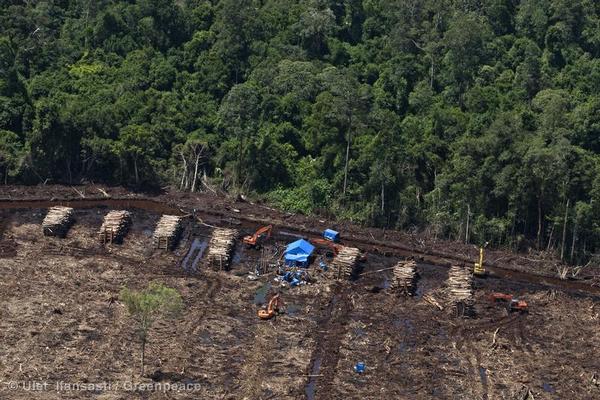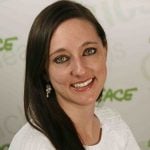Today Indonesia’s second largest pulp and paper producer agreed to turn off the bulldozers and protect the forest and high carbon peatlands and begin respecting the rights of local communities. This is a major breakthrough and we commend APRIL and parent company the Royal Golden Eagle Group for taking this step.
As recently as 4 months ago, Greenpeace released new images and video exposing the dramatic destruction of natural rainforests happening at the hands of APRIL and the Royal Golden Eagle Group. This heartbreaking lose of forests was paired with the draining of high carbon peatlands which causes significant greenhouse gas emissions and an increased risk for forest fires. APRIL also has a history of significant conflict with local communities in a number of its concessions. Years ago Greenpeace launched a campaign that went after APRIL’s customers and financiers. With the help of tens of thousands of supporters like you around the world, today, the entire RGE Group will begin charting a new path, a less destructive path, forward.

Piles of rainforest logs on cleared deep peatland in APRIL’s PT RAPP pulpwood concession on the Kampar peninsula.
APRIL’s new commitment has significance beyond its own operations. Along with Asia Pulp & Paper, who announced an end to deforestation in 2013, more than 80% of Indonesia’s pulp and paper is now covered by zero deforestation commitments. This is massive. Just a few years ago, Indonesia was one of the only places in the world where rainforests were turned into paper. That has now changed thanks to thousands of supporters who helped us find APRIL paper in stores and stood up to company after company to tell them rainforests should be about wildlife and climate protection and local communities, not throw-away packaging.

Of course the story does not end with today’s announcement. APRIL has made and broken promises like this before, so Greenpeace will be watching very closely. If we think the company is breaking its promises, we will act. But if APRIL and the entire RGE Group is serious about a fresh start, then we are ready to get our hands dirty and help make it happen.

My colleagues in Indonesia note this latest example of Indonesia’s biggest plantation companies distancing themselves from deforestation. Increasingly Indonesia’s business leaders are crying out for a development model based on forest protection. Yet even though companies are turning off their bulldozers, the destruction on the ground continues.
Late last year, Greenpeace and other NGOs went with Indonesia’s new President Jokowi to Riau, Sumatra. Jokowi was moved by the destruction he witnessed there, and he promised to protect what little forest remained.

Indonesian President, Joko Widodo joins members of the Sungai Tohor community in damming a canal draining peatlands on Tebing Tinggi island. Indonesias carbon-rich peatlands are being destroyed by the pulp and oil palm plantation industries, laying foundations for forest fires that devastate the lives of millions of people in the region.
It’s not too late for Indonesia’s President to take action and lead. He could close the loopholes in Indonesia’s forest moratorium so that all the remaining rainforests and peatlands are protected. He could stamp out corruption and toughen up the laws to stop companies destroying national parks and tiger habitat. He could reform the forest sector and ultimately help local communities stand up for their future – and their forests.
Today, Indonesia’s forests and wildlife are a little bit safer but our work is not done. With your help, we will make sure APRIL keeps its promises while we push Indonesia’s leaders to follow the lead of more and more businesses and forge a political future without deforestation.



